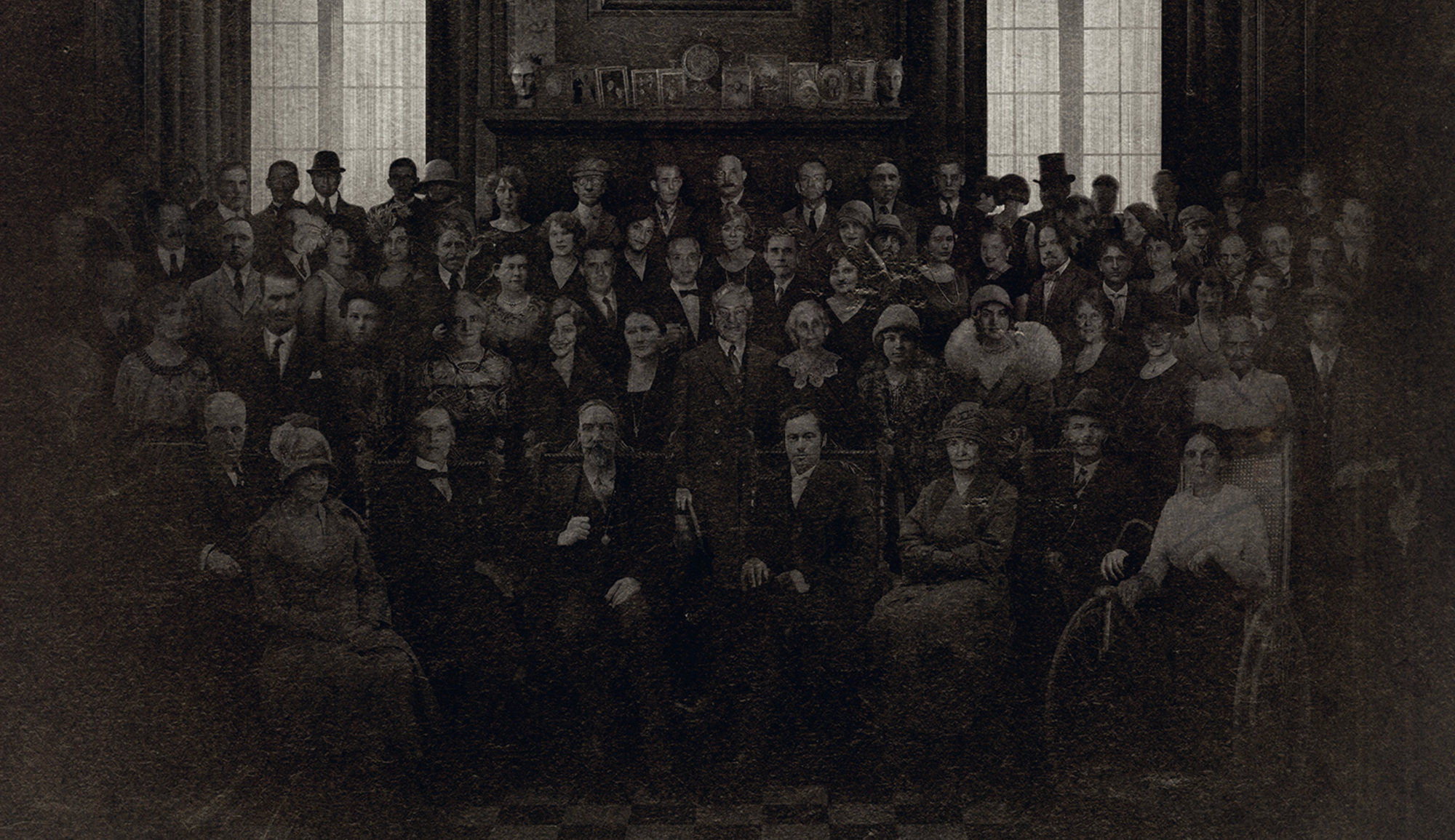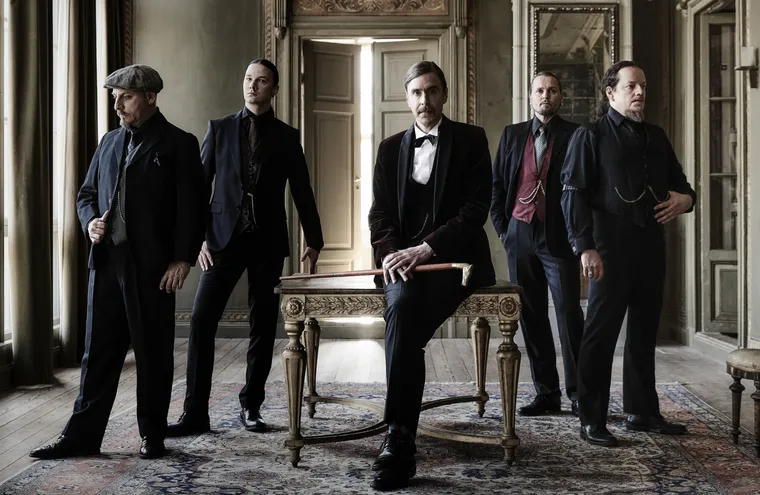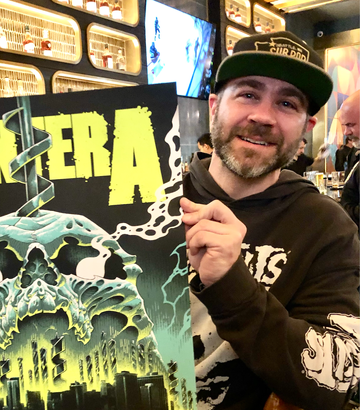“Draped in death…. The howl of lore….”
It’s with these lyrics that Mikael Åkerfeldt chose to begin Opeth’s 14th studio offering, The Last Will and Testament, a concept record that chronicles the reading of a wealthy, conservative patriarch’s final words to his next of kin. Set post-World War I, the story focuses on his family’s reaction to the stunning confessions he reveals in death. It is a tale wrought with deception, infidelity, and murder, all committed in the name of having a rightful heir to his fortunes – “the howl of lore.” In the context of the narrative, these opening lines set the stage for what’s to come.
In another sense, though, they speak to the lore, legend, and history of Opeth as a group. Since their inception, Opeth, and to a larger degree, Åkerfeldt have always stood out from their metal brethren. Early on, it was by presenting death and black metal in a progressive style with stunning clean passages from their then-meek frontman that set them apart from their peers. With each subsequent release in their discography, the band displayed a more concise and streamlined approach to songwriting, continuing to build upon their previous work without repeating themselves. Whether it was through concept albums, twin records featuring disparate harsh and mellow styles, abandoning death growls altogether, or releasing an album in both English and Swedish, Åkerfeldt and company have always held their music to the highest standard. They have guarded its integrity to the nth degree while striving to evolve as a group with each album. Perhaps “the howl of lore” can also refer to the weight on the Opeth frontman’s shoulders to further this legacy with each new release.

Adding to that burden is the recent criticism the group has taken for leaning into a progressive rock, mostly due to Åkerfeldt abandoning the death growls that had been present on most albums up to 2008’s Watershed. Metal purists decried them for daring to evolve to something beyond what they had been, but that has never been Opeth’s way. A band formed on equal parts Morbid Angel and Wishbone Ash, Mikael’s penchant for progressive rock is as well-known as his desire to avoid stagnation.
Those same metal purists would rejoice upon listening to the lead single for The Last Will and Testament, “§1,” as it featured the return of Mikael Akerfeldt’s legendary death growls. The first line growled after a sixteen year absence? “Draped in death… the howl of lore…”.
The news quickly spread throughout the metal community as fans around the globe emphatically claimed that Opeth were officially back. In typical fashion, when questioned about why he decided to bring them back now, Mikael had this to say:
“I like to be unfashionable, in a way.. So, when it comes to bringing that kind of death metal vocal back, I wanted it to happen when people had stopped caring… and I guess that’s now! Maybe it’s a bit surprising, but we did some anniversary type shows, and we played lots of old songs, and I just thought that my death metal voice sounded good. In the end I just thought, yeah, let’s give it a try.”
Though the welcome return of death growls dominated the metal news cycle for quite some time, it is hardly the headline here. On top of their triumphant return, other tidbits about The Last Will and Testament started to trickle out around the time the first single was released. The setting and loose plot for the concept was explained. Progressive rock legend Ian Anderson of Jethro Tull would be featured in a prominent role. Joey Tempest from Europe also makes a cameo. String arrangements would appear on several tracks. Digesting all of this information and trying to anticipate what this album could possibly sound like was a tall task for any Opeth fan. The pure ambition of the project might cause one to question how the band was going to actually pull this off. But don’t forget – it's Mikael Åkerfeldt we’re talking about here.
Any questions about how all these pieces could possibly fit together are quickly dispelled during the listener’s first spin of the record. The answer is spectacularly. Nearly three decades after the release of Orchid, Åkerfeldt and his bandmates have created an album that is equal parts brutally punishing and beautifully poetic, while crafting an intricate and complex storyline that matches the sophistication of their musical compositions. The Last Will and Testament flawlessly blends the band’s newer progressive style with their death metal roots in a way that seems natural and innate – as if this was always what Opeth was supposed to be. It is a record that sees the band indulge into their influences while also paving a new path forward for their inimitable career.
All of the tracks but one on The Last Will and Testament carries a proper name, as the first seven tracks all take the form of paragraphs in our narrator’s will. Anderson serves as the main protagonist’s voice, the wealthy patriarch who has passed on, as he reveals provocative secrets of the family history. The reactions of his twin sons, wife, and a polio-ridden girl the family has taken in are intertwined with the patriarch’s own confessions and regrets to create a compelling narrative about deception, guilt, and shame.
The aforementioned “§1” sets our story in motion and delivers a statement with the powerful death growls and heavy riffing that have been absent for so long. Upon an initial listen, it harkens back to Ghost Reveries, but those thoughts will soon dissipate as the album moves along.
“§2” starts similar to its predecessor, then delves into a progressive romp rife with sharp keyboard tones, and a soft bridge that shows the group in full metal minstrel mode. There is a call and response between Joey Tempest and Anderson in which Åkerfeldt qualified as "a dream come true." Despite his known affinity for both artists, the cameos from both work excellently to advance the plotline. Or, as Mikael puts it:
“You don’t want to have guests that just for the glitter and glamour…you want someone that’s going to add something to the record, and those two guys were perfect.”
The second single, “§3,” is the first on the album to not feature any death growls and leans more progressive, but with a refined edge that compels the narrative further without adhering to traditional song structure. Åkerfeldt offers a euphonious, almost a cappella vocal before the song ends menacingly.
The growls return for the beginning of “§4” in the form of a call and response between Mikael’s clean and harsh voices. The apex of this track, however, is the beautiful subdued middle section that feature a flute solo from Anderson, which as strange as it sounds, does not seem out of place and complements the music perfectly. The familiar flute notes roll into a mammoth, wall-of-sound riff that gives way to a towering solo from Fredrik Åkesson.
“§5” begins with a plucking acoustic rhythm accentuated with a beautiful backing melody to Åkerfeldt's clean vocals. Those same melodies are repeated with his voice turns coarse again, to nearly “Wreath” levels, and the resulting contrast is extremely pleasing to the ear. The string arrangements over the middle of the track are another welcome treat here, as is yet another contrasting clean and harsh call and response, perhaps representing the patriarch’s inner turmoil.
The Deep Purple tone of the intro to “§6” sets the stage for a galloping track that exemplifies the group’s musicianship. The rhythm section of veteran Martín Méndez and newcomer drummer Waltteri Väyrynen carry the torrid pace of the midsection of this track, not to be outdone by the Rainbow “Rising” meets Dream Theater dueling keyboard and guitar solos from Joakim Svalberg and Åkesson.
“§7” represents the culmination of the reading of the will and is propelled by Anderson’s narration alongside perhaps the most haunting and dazzling riff on the album, accentuated by a dizzying keyboard riff that creates an overall uneasy, unsettled tone. Though our time with the main protagonist ends there, “A Story Never Told” finishes the narrative with an unexpected twist – everything may not be as it seems in the patriarch’s eyes. Beginning with an introduction that would make Camel blush, Åkerfeldt proceeds to deliver what may be the most beautifully constructed ballad of his career – a epic, stunning composition that is sure to be widely celebrated upon its release to the general public.
These are just some of the highlights of what will become one of Opeth’s most celebrated accomplishments. I avoided describing the entire story, because to reveal the plot would detract from the overall listening experience. In order to truly grasp the depth and brilliance of The Last Will and Testament, I would recommend listening to it with the lyric insert and parsing over it to decipher Åkerfeldt’s prose. It may take a few spins, but this is an incredibly rewarding listen when everything clicks.
The allure of Opeth is the level of intelligence and integrity engulfed in every album they have ever crafted. The Last Will and Testament is no exception. It is a record that adds to their already majestic legacy that will further enshrine them as one of the greatest bands, metal or otherwise, of our time. The complexity and quality of the music and story have been well-nurtured, wrought over, and delivered with the greatest of care - for the legacy of what came before it and what will come after it.
The howl of lore, indeed.
Rating: 10/10. An absolute masterpiece from cover to cover.
The Last Will and Testament will be released on November 22, 2024 through Reigning Phoenix Records.


